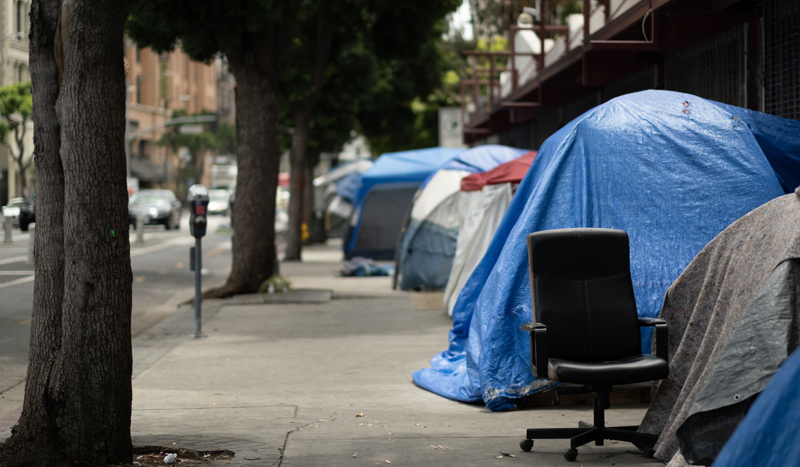
CV NEWS FEED // The CEO of a luxury department store in San Francisco slammed both the state and city governments in a letter on Sunday, calling them out for their ineffective handling of the city’s rising crime and homelessness rates.
In the open letter, Gump’s CEO John Chachas urged California Gov. Gavin Newsom, San Francisco Mayor London Breed, and the San Francisco Board of Supervisors to abandon the “failed public policies” that have led to the current crisis, where the homeless, drug dealers and addicts are allowed “to occupy our sidewalks, to openly distribute and use illegal drugs, to harass the public and to defile the city’s streets.”
“Such abject disregard for civilized conduct makes San Francisco unlivable for its residents, unsafe for our employees, and unwelcoming to visitors from around the world,” Chachas wrote.
The city’s failure to handle the crisis impacted federal employees recently at the Nancy Pelosi Federal Building in San Francisco. The building houses offices for the former House Speaker (for which it is named), as well as employees of the U.S. Department of Health and Human Services, the Department of Labor, and the Department of Transportation.
At the same time that President Biden urged federal employees to return to in-person work, the Department of Health and Human Services issued a memo recommending employees work from home because of safety concerns due to high crime rates near the federal building. The San Francisco Chronicle reported that the area around the office is a hot spot for drug dealers, who traffic in fentanyl with impunity in open-air drug markets.
Allysia Finley, a reporter for the Wall Street Journal, told FOX News that California’s Proposition 47, an amendment which effectively decriminalized drug usage in 2014, led to increases in the homeless population over the years.
The San Francisco Chronicle reported that in 2022, San Francisco had over 7,754 homeless people, with around 4,400 sleeping on the streets, in a tent, or in a vehicle. Finley said that 90% of San Francisco’s homeless population is made up of people from across the U.S. who move to California for easy access to drugs.
According to reports from FOX News, San Francisco has spent $20 billion to house the homeless since 2020—but the latest data show that 55% of people on the streets have refused shelter.
Finley said that because the homeless aren’t allowed to use drugs in shelters, many opt to remain on the streets.
“It [homelessness] has nothing to do with housing costs,” Finley said. “The problems are drug use and mental illness.”
She also pointed out that the Ninth Circuit Court of Appeals declared a “constitutional right to vagrancy” in 2018.
“They read into the constitution a right to vagrancy by saying that states are localities that cannot enforce anti-camping laws or clear their streets of homeless people,” Finley said. The Eighth amendment of the US Constitution—prohibiting cruel and unusual punishment—is now interpreted to mean local governments may not move homeless people off the streets.
“This has made it very difficult for cities, particularly like San Francisco, to force their drug addicts into treatment or even into jail,” she said.
Finley also said that the problem with drugs and homelessness has gotten worse since the COVID pandemic in 2020, when the city paid homeless people to stay in hotel rooms. To give the homeless an incentive to stay in the rooms and practice social distancing, the city also paid for drugs and alcohol, worsening the problem.
FOX reported that Chachas spoke out in 2021, criticizing the increased crime rates in the city. In his letter on Sunday, Chachas re-affirmed his concerns, saying that the homelessness and crime in San Francisco make him wonder if Gump’s will close due to “the profound erosion of this city’s current conditions.”
“Gump’s implores the Governor, the Mayor, and the City Supervisors to take immediate actions, including cleaning the city streets, removing homeless encampments, enforcement of city and state ordinances, and returning San Francisco to its rightful place as one of America’s shining beacons of urban society,” Chachas wrote.

